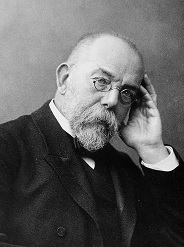Jan 24, 2026
Jan 24, 2026
 Robert Koch (1843-1910) was a German bacteriologist. He with his colleagues developed techniques for culturing bacteria outside the body (in vitro). On the basis of this he formulated rules (postulates) for ascertaining whether or not a particular bacterium was the cause of the disease.
Robert Koch (1843-1910) was a German bacteriologist. He with his colleagues developed techniques for culturing bacteria outside the body (in vitro). On the basis of this he formulated rules (postulates) for ascertaining whether or not a particular bacterium was the cause of the disease.
Koch's Postulates
The four postulates were:
(i) the microorganism in question must be present in the lesion at all times;
(ii) pure cultures must be obtained from it;
(iii) pure cultures when inoculated into susceptible animals must produce the diseases or pathological conditions; and
(iv) the organism must be obtained again in pure culture from the inoculated animals.
Koch discovered the bacilli responsible for anthrax (1876), tuberculosis (1882), and cholera (1883). He was awarded the Nobel Prize in Physiology and Medicine in 1905.
Robert Koch was born on December 11, 1843 in a simple timber home near Hanover. He was the third of 13 children of a lead-mining engineer. Money was scarce in the Koch household. He enrolled in a natural-sciences course at the University of Gottingen in 1862, and later switched on to medicine. At the age of 23, after his MD he married Emmy,
who became his loyal helpmate. Koch served as an army doctor in the Franco-Prussion war of 1870-71. Later, he served as a medical expert for court trials, and supervised public-health services. On his 29th birthday Emmy bought him a fine microscope. He immediately started using the microscope to study blood samples of animals that died due to anthrax.
This disease was a great killer of sheep, cattle and horses and occasionally humans. By that time some staining techniques were developed by some other workers using analine dyes, and to take photographs Koch fixed a camera on his microscope.
Koch never remained idle, and turned his investigations towards wound infection in soldiers, and isolated six different types of bacteria causing wound infection. Around that time the English surgeon Joseph Lister had started applying carbolic dressings to war wounds.
Next, Koch took up work on tuberculosis, and found the cause of was not malnutrition, but Mycobacterium tuberculosis (TB bacilli).
Later in 1983 the disease cholera made headlines. Its outbreaks were reported from Egypt and India. The Robert Koch Institute, Berlin identified the strains of cholera bacteria and submitted the report to the
World Health Organization (WHO) which traced the bacterial source to Angola. Other scientists following Koch's dictates identified the causative organisms for a number of diseases including typhus, leprosy, malaria, diphtheria, tetanus, pneumonia, dysentery, and plague. Exhausted by a lifetime of hard work Robert Koch died on My 27, 1910.
07-Dec-2019
More by : Dr. Frank S. K. Barar